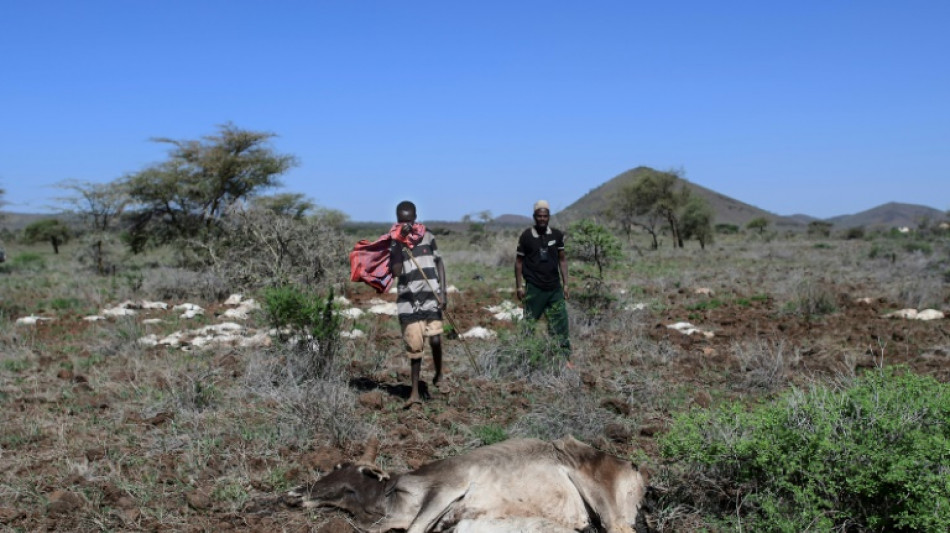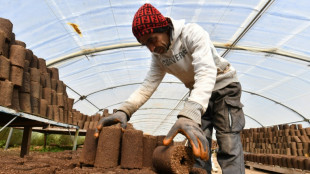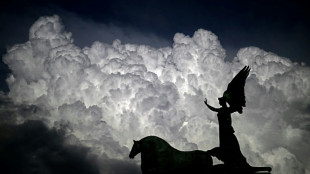
-
 Saka 'ready to go' after long injury lay-off: Arteta
Saka 'ready to go' after long injury lay-off: Arteta
-
Ingebrigtsen Sr, on trial for abusing Olympic champion, says he was 'overly protective'

-
 Tourists and locals enjoy 'ephemeral' Tokyo cherry blossoms
Tourists and locals enjoy 'ephemeral' Tokyo cherry blossoms
-
Khamenei warns of 'strong' response if Iran attacked

-
 France fines Apple 150 million euros over privacy feature
France fines Apple 150 million euros over privacy feature
-
UK PM urges nations to smash migrant smuggling gangs 'once and for all'

-
 Thai authorities probe collapse at quake-hit construction site
Thai authorities probe collapse at quake-hit construction site
-
France's Le Pen convicted in fake jobs trial

-
 Chinese tech giant Huawei says profits fell 28% last year
Chinese tech giant Huawei says profits fell 28% last year
-
Trump says confident of TikTok deal before deadline

-
 Myanmar declares week of mourning as hopes fade for quake survivors
Myanmar declares week of mourning as hopes fade for quake survivors
-
Japan's Nikkei leads hefty market losses, gold hits record

-
 Tears in Taiwan for relatives hit by Myanmar quake
Tears in Taiwan for relatives hit by Myanmar quake
-
Venezuela says US revoked transnational oil, gas company licenses

-
 'Devastated': Relatives await news from Bangkok building collapse
'Devastated': Relatives await news from Bangkok building collapse
-
Arsenal, Tottenham to play pre-season North London derby in Hong Kong

-
 Japan's Nikkei leads hefty equity market losses; gold hits record
Japan's Nikkei leads hefty equity market losses; gold hits record
-
Israel's Netanyahu picks new security chief, defying legal challenge

-
 Trump says US tariffs to hit 'all countries'
Trump says US tariffs to hit 'all countries'
-
Prayers and tears for Eid in quake-hit Mandalay

-
 After flops, movie industry targets fresh start at CinemaCon
After flops, movie industry targets fresh start at CinemaCon
-
Tsunoda targets podium finish in Japan after 'unreal' Red Bull move

-
 French chefs await new Michelin guide
French chefs await new Michelin guide
-
UK imposes travel permit on Europeans from Wednesday

-
 At his academy, Romanian legend Hagi shapes future champions
At his academy, Romanian legend Hagi shapes future champions
-
Referee's lunch break saved Miami winner Mensik from early exit

-
 Djokovic refuses to discuss eye ailment after shock Miami loss
Djokovic refuses to discuss eye ailment after shock Miami loss
-
Mitchell magic as Cavs bag 60th win, Pistons and T'Wolves brawl

-
 Mensik shocks Djokovic to win Miami Open
Mensik shocks Djokovic to win Miami Open
-
Duterte lawyer: 'compelling' grounds to throw case out

-
 What happens on Trump's 'Liberation Day' and beyond?
What happens on Trump's 'Liberation Day' and beyond?
-
Clock ticks on Trump's reciprocal tariffs as countries seek reprieve

-
 Japan-Australia flagship hydrogen project stumbles
Japan-Australia flagship hydrogen project stumbles
-
Musk deploys wealth in bid to swing Wisconsin court vote

-
 Mensik upsets Djokovic to win Miami Open
Mensik upsets Djokovic to win Miami Open
-
China manufacturing activity grows at highest rate in a year

-
 'Waited for death': Ex-detainees recount horrors of Sudan's RSF prisons
'Waited for death': Ex-detainees recount horrors of Sudan's RSF prisons
-
Japan's Nikkei leads big losses in Asian markets as gold hits record

-
 Rescue hopes fading three days after deadly Myanmar quake
Rescue hopes fading three days after deadly Myanmar quake
-
'Basketbrawl' as seven ejected in Pistons-Wolves clash

-
 Four men loom large in Microsoft history
Four men loom large in Microsoft history
-
Computer pioneer Microsoft turns 50 in the age of AI

-
 Trump calls out both Putin and Zelensky over ceasefire talks
Trump calls out both Putin and Zelensky over ceasefire talks
-
Kim Hyo-joo tops Vu in playoff to win LPGA Ford Championship

-
 Economy and especially Trump: Canadians' thoughts on campaigns
Economy and especially Trump: Canadians' thoughts on campaigns
-
Liberal PM Carney takes lead four weeks before Canada vote

-
 SpaceX to launch private astronauts on first crewed polar orbit
SpaceX to launch private astronauts on first crewed polar orbit
-
Australia open door for Kerr's return as Matildas captain

-
 The Premier League's unlikely pretenders to Champions League riches
The Premier League's unlikely pretenders to Champions League riches
-
IFabric Corp Reports Record Q4 and Full Year 2024 Revenues and Strong Profitability


Livelihoods lost as climate disaster woes mount in Kenya
Dabaso Galgalo is now used to the smell and grisly spectacle of rotting flesh festering in the scorching heat as Kenya reels from a spate of climate disasters.
Surrounded by barren scrubland littered with withered carcasses of sheep and goats, the 56-year-old pastoralist is struggling to keep his beloved animals, and himself, alive.
What was left of his herd after a months-long dry spell was decimated by once-in-a-generation floods that hit northern Kenya, the latest in a series of unforgiving climate shocks lashing the region.
"We recently had heavy rains and strong winds that ended up killing livestock that had gathered at this water point," he told AFP, outside a settlement called 'kambi ya nyoka' (snake camp) in Marsabit.
The semi-arid region has been the scene of a prolonged drought. Then, when the rains finally came, the deluge pushed communities, who rely exclusively on livestock for their survival, to the edge of disaster.
"This is a very huge loss because we have lost lots of resources following this tragedy," said Galgalo.
"If one had 500 goats (earlier), they have between five and 20 goats left."
Nomadic livestock herders in East Africa's drylands have learnt to cope with the vagaries of weather over decades, driving their relentless search for water and pasture in some of the world's most inhospitable terrain.
But their resilience is being severely tested by climate change.
- Fight for resources -
Poor rainfall in the last quarter of 2021 -- the third consecutive failed rainy season -- followed a devastating locust invasion a year earlier, with animals now too weak to produce milk or too skinny to be sold.
There are growing fears that as the situation worsens, tensions among communities could sharpen as they compete for access to meagre resources.
Marsabit is particularly vulnerable because of a perennial conflict between the Borana and Gabra pastoralist communities.
President Uhuru Kenyatta declared the drought a natural disaster last September, with 2.1 million people -- four percent of Kenya's population -- already grappling with hunger, according to government figures.
The government said last week that 23 of the country's 47 counties faced "food and water stress" while the meteorological department has warned of a potential increase in "human-to-human and human-to-wildlife conflicts".
The authorities have invested 450 million shillings ($3.9 million, 3.4 million euros) to buy 11,250 cattle and 3,200 goats from farmers in the worst-hit counties.
- Africa hardest-hit -
East Africa endured a harrowing drought in 2017 which also brought neighbouring Somalia to the brink of famine.
In 2011, two successive failed rainy seasons in 12 months led to the driest year since 1951 in arid regions of Kenya, Somalia, Ethiopia, Djibouti and Uganda.
With conflicts raging in Ethiopia and Somalia, aid agencies are struggling to assess the true extent of the current crisis.
Experts say extreme weather events are happening with increased frequency and intensity due to climate change -- with Africa, which contributes the least to global warming, bearing the brunt.
For Galgalo, the race is on to save his remaining animals and protect his only source of income.
But he is losing hope.
"They are suffering from pneumonia and are still dying," he said.
L.Durand--AMWN

